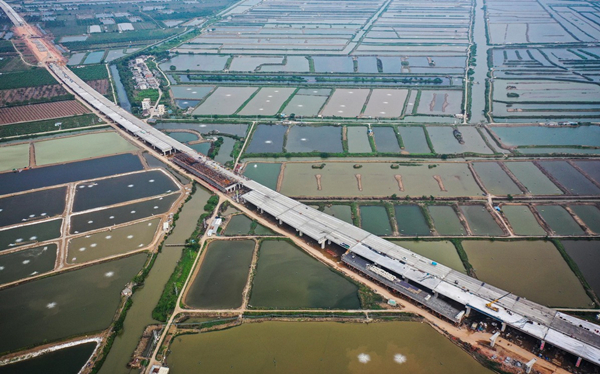Major transportation projects fuel growth of Greater Bay Area

The construction sites of Huangmao Cross-Sea Bridge in Zhuhai, Guangdong province, on May 1, 2021. [Photo/Xinhua]
A series of mega transportation projects, including railway, airport, logistic hub, sea-crossing bridge and channel have been landing in South China's Greater Bay Area in recent years. The move further enhances the connectivity between Hong Kong, Macao and mainland areas, and brings in new opportunities for future development, Economic Information Daily reported.
It used to take a long time to travel from Guangdong's Jiangmen to Zhuhai via land routes, but the problem will soon be solved once the sea-crossing bridge connecting the two cities is put into operation.
With total length of 31 kilometers, the Huangmao Cross-Sea Bridge, expected to be the world's largest three-tower cable-stayed bridge, will effectively push forward interactive development between the Pearl River Delta and western regions in Guangdong province.
Advanced equipment manufacturing sector in the delta, along with Hengqin New Area and Gaolan Port, are expected to build up closer economic ties with the greater Guangdong Harbor Economic Zone in Jiangmen, after the bridge opens to traffic.
About 100 kilometers away from the Eastern Huangmao Sea, construction of a bridge crossing over the Lingding Sea to connect Zhongshan and Shenzhen in Guangdong province has stepped up.
The 24-kilometer bridge is scheduled to be completed in 2024, and the drive between the two cities will be significantly reduced from the current two hours to about 20 minutes.
The railway transportation system in the Guangdong-Hong Kong-Macao Greater Bay Area also has matured. The region's total railway routes have exceeded 2,200 kilometers, with high-speed railway over 1,200 km and urban rail transit in operation surpassing 1,000 km.
In terms of air passage, Guangzhou Baiyun International Airport and Shenzhen Airport are conducting expansion projects, and the site of a new airport in Foshan has been approved by the Civil Aviation Administration.
Early in June this year, the Nansha International Logistics Center in Guangzhou started trial operation, which enables seamless multi-modal transport by providing road, rail and maritime services at the same time.
"The network has greatly improved the efficiency of cargo transportation in the Greater Bay Area, and lays a solid foundation for ports in the Pearl River Delta to enhance international competitiveness." said He Haining, general manager of Guangzhou Port Logistics Co Ltd.
In the first quarter of this year, Guangzhou's goods import and export hit 1.8 trillion yuan, with the majority of business volume concentrating on the Pearl River Delta.
Covering an area of 56,000 square kilometers and 70 million in population, the GBA is one of the most active regions across the country in openness and economic vitality.
As transport infrastructure further upgrades, the area will unearth and harness great opportunities for economic take-off.
